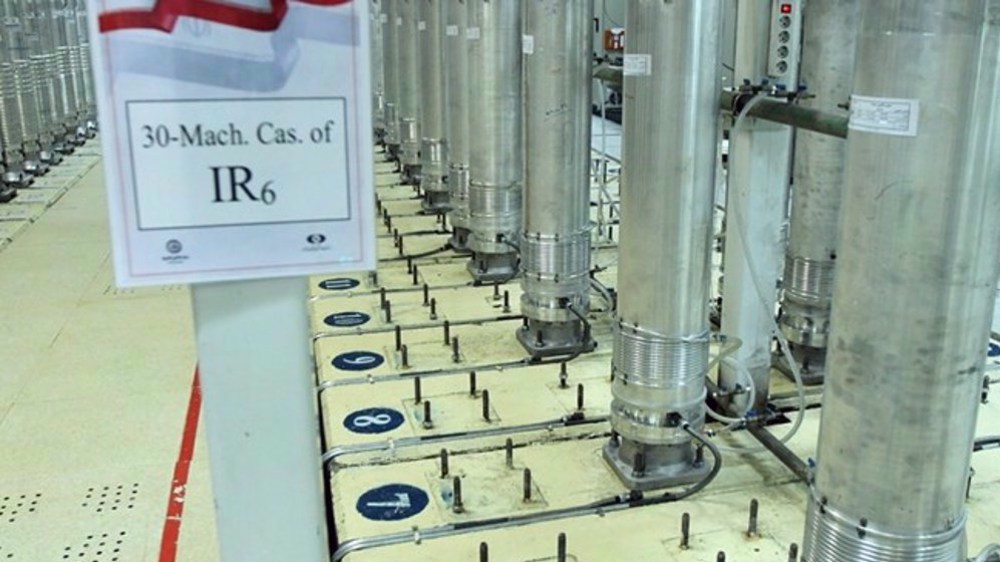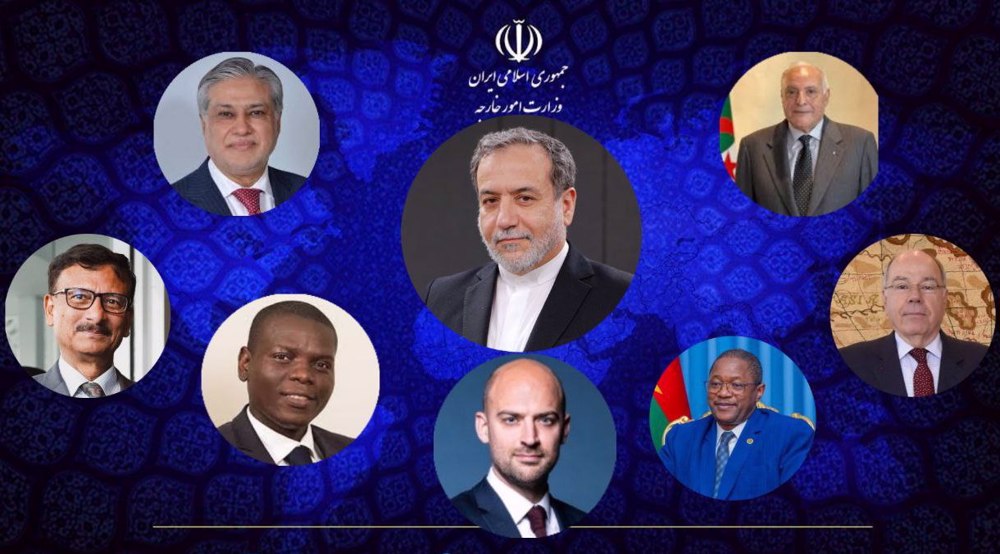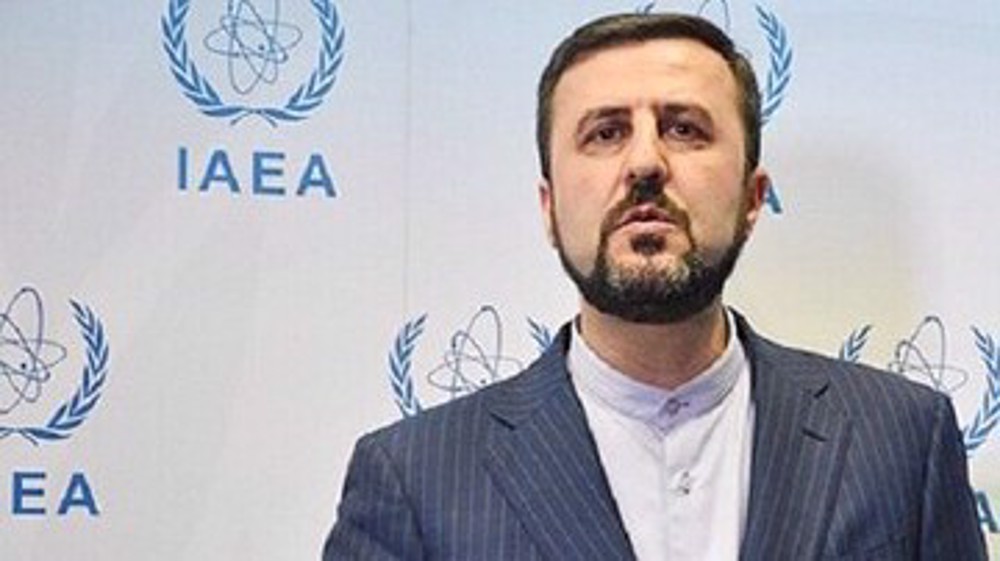Foreign Minister Zarif says Iran's commitments reduction allowed under JCPOA
Iran's Foreign Minister Mohammad Javad Zarif says the three steps taken by the Islamic Republic to reduce its commitments under a nuclear deal it clinched with world powers in 2015 are legitimate and allowed under the agreement.
Zarif made the remarks in a meeting with the visiting acting head of the International Atomic Energy Agency (IAEA) Cornel Feruta in Tehran on Sunday.
Iran's top diplomat said all measures taken “by the Islamic Republic of Iran to reduce its commitments in response to the European sides’ failure to fulfill theirs” conformed to Article 36 of the deal, which is officially known as the Joint Comprehensive Plan of Action (JCPOA).
The Atomic Energy Organization of Iran (AEOI) said on Saturday that the country has started up advanced centrifuges to boost its stockpile of enriched uranium, warning the signatories to the nuclear deal that the clock was ticking for them to salvage the landmark agreement in the face of pressure by the United States.
As a third step in Iran's reduction of commitments under the deal, the AEOI said it has activated 20 IR-4 and 20 IR-6 centrifuges for research and development purposes.
The third step comes after the Europeans failed to work within a 60-day deadline to meet Iran’s demands and fulfill their commitments under the multilateral deal. Iran had already rowed back on its nuclear commitments twice in compliance with Articles 26 and 36 of the JCPOA.
Iran says its retaliatory measures will be reversible as soon as Europe finds practical ways to shield the mutual trade from the US sanctions, which were re-imposed last year when President Donald Trump withdrew from the JCPOA.
Iran has given another two months to the European signatories to take meaningful action to save the JCPOA as a France-led diplomatic process is underway between the two sides.
On the same day that Iran took the third step, the IAEA said it had inspectors on the ground in Iran who would be able to look into Tehran's move to turn on advanced centrifuges to increase the country's uranium stockpiles.
The Vienna-based agency added that its "inspectors are on the ground in Iran and they will report any relevant activities to IAEA headquarters."
Elsewhere in his remarks, Zarif pointed to the close cooperation between Iran and the IAEA after the signing of the landmark nuclear accord, which led the IAEA to confirm Iran's compliance with its JCPOA commitments in over a dozen reports.
Iran's top diplomat also called on the IAEA to observe the principles of professionalism, confidentiality, and impartiality in fulfilling its duties regarding Iran.
The acting IAEA acting chief, for his part, said the agency has been working to build more trust and would carry out its verification activities in a professional and impartial manner.
Feruta arrived in the Iranian capital on Sunday morning to hold talks with high-level Iranian officials. The IAEA said the visit was part of its "ongoing interactions" with Tehran, including "verification and monitoring in Iran under the JCPOA."
Earlier on Sunday, the Romanian diplomat held talks with the AEOI Head Ali Akbar Salehi.
During the meeting, Iran’s nuclear chief criticized the European signatories to the 2015 nuclear agreement for failing to honor their legal commitments to Tehran, adding that the multinational accord is “no one-way street.”
Read more:
- Iran to further cut nuclear commitments as of Friday: Rouhani
- Zarif says Europe must take practical steps to guarantee Iran’s oil revenues
- IAEA verifies Iran's compliance with JCPOA on heavy water stockpile limitation
- EU welcomes any progress beyond maintaining Iran nuclear deal: Mogherini
IAEA will continue impartial, professional approach: Feruta
Speaking at a joint press conference with Iran's nuclear chief, Feruta said the UN nuclear agency would continue with its independence, impartial and professional approach and would not be affected by pressure.
He added that the IAEA is tasked with verifying the JCPOA implementation and is involved in dynamic interaction with Iran on the implementation of the Additional Protocol and its Safeguard Agreement.
He expressed the IAEA enthusiasm to continue cooperation with Iran.
IAEA underlines ‘impartiality’ in conducting safeguards activities
Later on Sunday, the IAEA issued a statement on Feruta’s Tehran visit, quoting him as saying that the agency’s “safeguards activities are conducted in an impartial, independent and objective manner.”
Acting Director General Cornel Feruta visited Iran on 8 September 2019, and met with Vice-President and President of the Atomic Energy Organization of Iran Ali Akbar Salehi, Foreign Minister Mohammad Javad Zarif and other Iranian senior officials, the statement said.
The IAEA noted that Feruta’s discussions with the Iranian officials “covered IAEA activities in Iran, with an emphasis on the ongoing interactions between the IAEA and Iran related to the implementation of the Safeguards Agreement and Additional Protocol.”
VIDEO | IAEA adopts anti-Iran resolution tabled by E3
VIDEO | Iran's president urges Pope to help end Israel's onslaught in Gaza
Iran's senior legal official: ICC arrest warrants for Netanyahu ‘great victory'
Nov. 21: ‘Axis of Resistance’ operations against Israeli occupation
VIDEO | Israeli forces storm West Bank’s Jenin again, target civilians
Iran activates advanced centrifuges after IAEA's 'unjust' resolution
VIDEO | Press TV's news headlines
Iran FM: Response to Israeli aggression 'inevitable'












 This makes it easy to access the Press TV website
This makes it easy to access the Press TV website